Macro-Finance Salon (No. 110): The Seminar on China-US Trade Confrontation and International Order
2018-12-20 IMI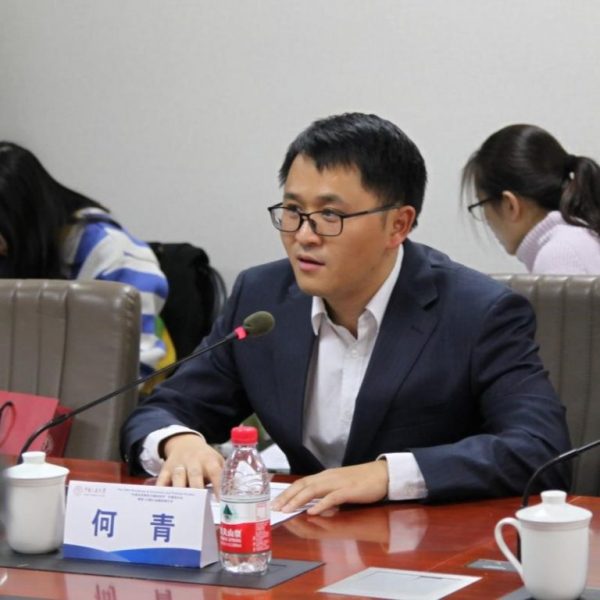 This roundtable seminar consisted of two stages and was chaired by the Deputy Director of IMI, Tu Yonghong.
This roundtable seminar consisted of two stages and was chaired by the Deputy Director of IMI, Tu Yonghong.
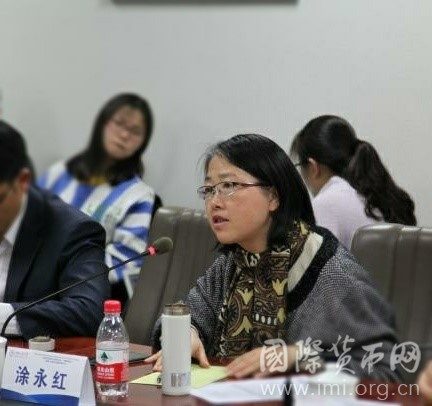 Zhuang Tailiang analyzed the causes and effects of the Sino-US trade war. He pointed out that the Sino-US trade deficit, the mid-term elections, and Trump’s intention for 2020 re-election were the three main reasons for the Sino-US trade war. He also stated that we should have confidence in the country, and the trade war has little impact on China as a whole.
Zhuang Tailiang analyzed the causes and effects of the Sino-US trade war. He pointed out that the Sino-US trade deficit, the mid-term elections, and Trump’s intention for 2020 re-election were the three main reasons for the Sino-US trade war. He also stated that we should have confidence in the country, and the trade war has little impact on China as a whole.
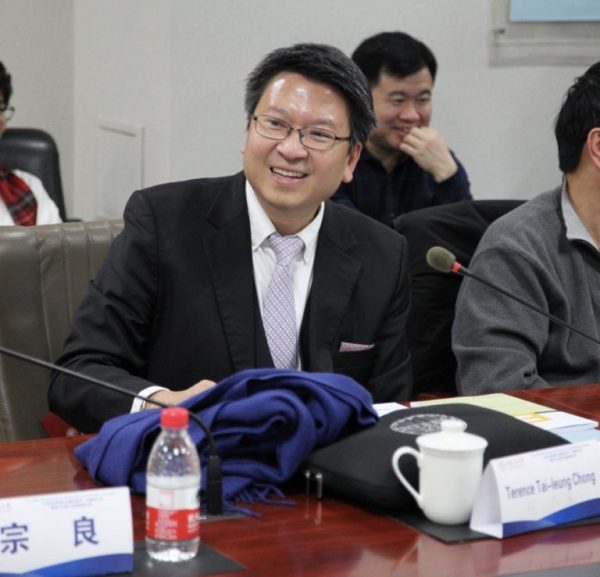 From the perspective of international relations, Li Wei introduced the contact and defense between China and the United States in different stages. He believed that the Sino-US trade war was a major strategic adjustment in US’s China policy over the past 40 years. He also pointed out that the economic interests, the ideology, and security and strategy have shaped the US’s economic and trade policies for China in different time periods. The US economic strategy for China is divided into three categories: economic assistance, economic decoupling and containment strategy. The future Sino-US relationship is not clear, but China should actively respond to Sino-US relations, value and leverage the giant market with over 1.3 billion population, and stimulate domestic demand; At the same time, China should maintain relations with other developed countries, especially Europe and Japan.
From the perspective of international relations, Li Wei introduced the contact and defense between China and the United States in different stages. He believed that the Sino-US trade war was a major strategic adjustment in US’s China policy over the past 40 years. He also pointed out that the economic interests, the ideology, and security and strategy have shaped the US’s economic and trade policies for China in different time periods. The US economic strategy for China is divided into three categories: economic assistance, economic decoupling and containment strategy. The future Sino-US relationship is not clear, but China should actively respond to Sino-US relations, value and leverage the giant market with over 1.3 billion population, and stimulate domestic demand; At the same time, China should maintain relations with other developed countries, especially Europe and Japan.
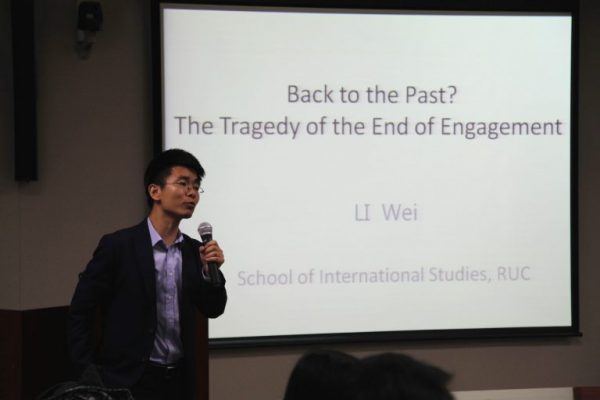 Di Dongsheng talked about the Sino-US trade war from the fiscal perspective. In his speech, he first analyzed some misjudgments of causes of the trade war: the Thucydides trap, the blockade of China's technology upgrading, manufacturing job creation to win over the blue-collar voters, a shift of attention from the “Russia Gate” narrative, and the extortion for self-praise. He pointed out that the reason for the US to launch a trade war is actually due to Trump’s tax reduction policy. Therefore, he suggested that China should adjust the objectives and means of trade wars, and should not rely on large-scale procurement in exchange for the tariff exemption, but should focus on putting pressure on the capital market.
Di Dongsheng talked about the Sino-US trade war from the fiscal perspective. In his speech, he first analyzed some misjudgments of causes of the trade war: the Thucydides trap, the blockade of China's technology upgrading, manufacturing job creation to win over the blue-collar voters, a shift of attention from the “Russia Gate” narrative, and the extortion for self-praise. He pointed out that the reason for the US to launch a trade war is actually due to Trump’s tax reduction policy. Therefore, he suggested that China should adjust the objectives and means of trade wars, and should not rely on large-scale procurement in exchange for the tariff exemption, but should focus on putting pressure on the capital market.
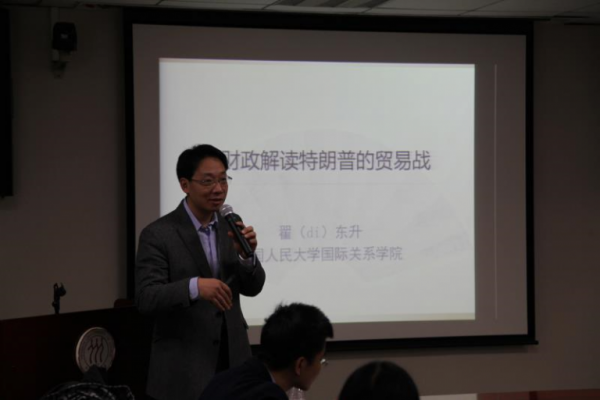 Professor Donald Lien commented on the views of several speakers. He believes that the Sino-US trade war will not have a particularly large economic impact, but in terms of the international environment, it may bring about a greater change in mentality and other broad implications. Afterwards, the guest speakers and the panelists conducted in-depth discussions on the causes and effects of the Sino-US trade war.
Professor Donald Lien commented on the views of several speakers. He believes that the Sino-US trade war will not have a particularly large economic impact, but in terms of the international environment, it may bring about a greater change in mentality and other broad implications. Afterwards, the guest speakers and the panelists conducted in-depth discussions on the causes and effects of the Sino-US trade war.
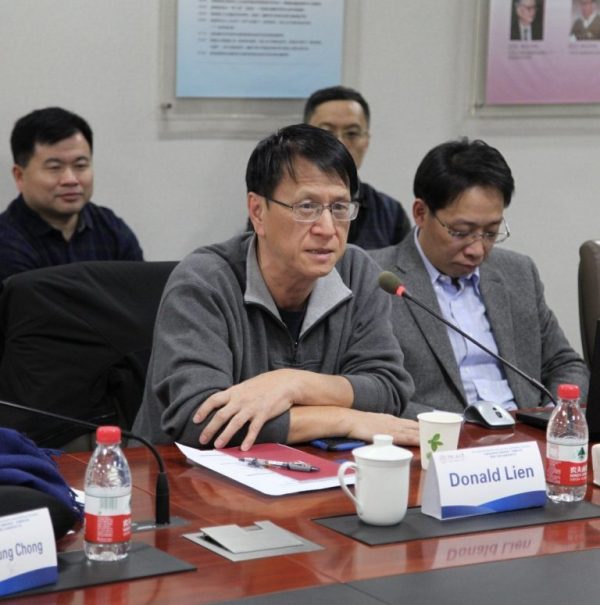 After a short tea break, the second phase of the roundtable discussion began. Qu Fengjie elaborated on the impact and countermeasures of Sino-US trade frictions. She believes that the Sino-US trade war is rooted in the strategic misjudgments between the two countries on their respective strengths and Sino-US relations. Sino-US relations have entered a phase featured by the strategic competition or even strategic containment. Therefore, China must avert the risks of de-Chinaization and technical blockades in the international rules system. China must reform, open up, solve pain points, avoid war mentality, identify the gap between sci-tech and finance, actively study China's positions and measures to promote the WTO reform, ensure that post-border rules align with the international standards, and strengthen multi-disciplinary and multi-channel communication with the United States. China should also innovate the support system, make key technology breakthroughs, avoid reversal in our opening-up process, and avoid the arbitrariness of policies.
After a short tea break, the second phase of the roundtable discussion began. Qu Fengjie elaborated on the impact and countermeasures of Sino-US trade frictions. She believes that the Sino-US trade war is rooted in the strategic misjudgments between the two countries on their respective strengths and Sino-US relations. Sino-US relations have entered a phase featured by the strategic competition or even strategic containment. Therefore, China must avert the risks of de-Chinaization and technical blockades in the international rules system. China must reform, open up, solve pain points, avoid war mentality, identify the gap between sci-tech and finance, actively study China's positions and measures to promote the WTO reform, ensure that post-border rules align with the international standards, and strengthen multi-disciplinary and multi-channel communication with the United States. China should also innovate the support system, make key technology breakthroughs, avoid reversal in our opening-up process, and avoid the arbitrariness of policies.
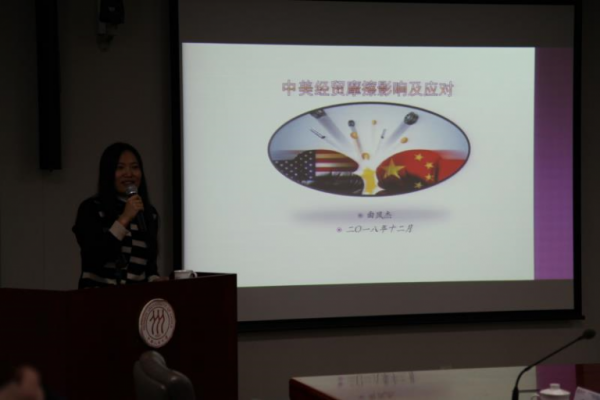 Ding Haoyuan analyzed the innovation of private enterprises from the perspective of the trade war. He said that the trade war, to some extent, is a battle for the commanding heights, and it is a dispute over the strength of science and technology underpinned by intellectual property rights. China and the United States have very large gaps in tort compensation, and Chinese people have low awareness of copyright. China's current patent application is ranked second in the world, but at the same time, patent and invention purchases are also ranked second, and financial innovation is lacking. Therefore, the Chinese government should actively mobilize funds to support private enterprises and stimulate the innovation of private enterprises.
Ding Haoyuan analyzed the innovation of private enterprises from the perspective of the trade war. He said that the trade war, to some extent, is a battle for the commanding heights, and it is a dispute over the strength of science and technology underpinned by intellectual property rights. China and the United States have very large gaps in tort compensation, and Chinese people have low awareness of copyright. China's current patent application is ranked second in the world, but at the same time, patent and invention purchases are also ranked second, and financial innovation is lacking. Therefore, the Chinese government should actively mobilize funds to support private enterprises and stimulate the innovation of private enterprises.
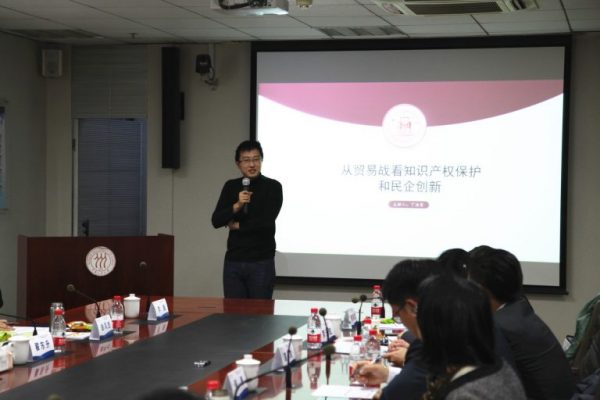 Zong Liang analyzed the trade disputes between China and US from three aspects. He first clarified the origin of the trade war and noted that we should figure out the international rules. Then he pointed out that the trade war depends on the comprehensive competitive advantages of the two countries after analyzing the model of Sino-US economic and trade confrontation. Finally, he proposed that the market economy model should have new connotations and standards, and a fair and rational new international economic and trade order should be put in place.
Zong Liang analyzed the trade disputes between China and US from three aspects. He first clarified the origin of the trade war and noted that we should figure out the international rules. Then he pointed out that the trade war depends on the comprehensive competitive advantages of the two countries after analyzing the model of Sino-US economic and trade confrontation. Finally, he proposed that the market economy model should have new connotations and standards, and a fair and rational new international economic and trade order should be put in place.
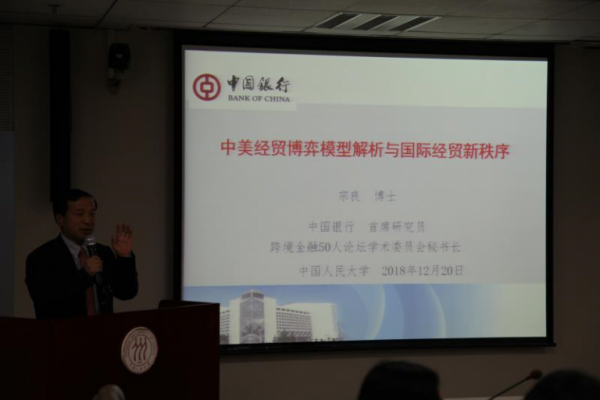 Later, Zhu Wenyu, Lu Liping, Qian Zongxin and other scholars commented on the views of the keynote speakers and expressed their own views. Luo Tianhong, deputy editor-in-chief of Economic and Political Studies, made a summary of the meeting.
Later, Zhu Wenyu, Lu Liping, Qian Zongxin and other scholars commented on the views of the keynote speakers and expressed their own views. Luo Tianhong, deputy editor-in-chief of Economic and Political Studies, made a summary of the meeting.
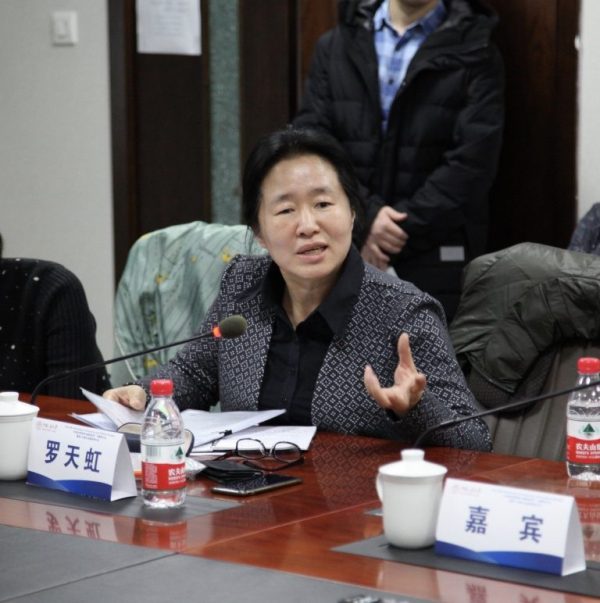
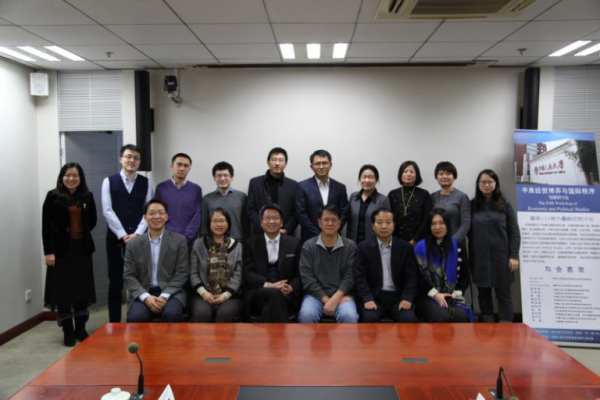 Economic and Political Studies (EPS, CN 10-1049/C, ISSN 2095-4816) is an English academic quarterly managed by the Ministry of Education, hosted by Renmin University of China and promoted to overseas audience by the well-known publishing group, Taylor& Francis Group. It is sponsored by the Academic Translation Project of the National Social Science Fund and aims to promote the communication and dialogue between Chinese and foreign scholars. Since its inception in 2013, EPS is growing rapidly. Following the inclusion of the journal in CrossRef, Google Scholar, OCLC, RePEc and other search databases, Economic and Political Studies was included in ESCI (the “Emerging Resource Citation Index Database”) in 2017 and was later included in the world's largest abstract and citation database, Scopus, in 2018. The current Editor-in-Chief is Professor Liu Wei, the Chancellor of Renmin University of China, and the Executive Editor is Professor He Qing. For more information, please visit http://www.tandfonline.com/reps.
Macro-Finance Salon, a high-level academic salon jointly organized by IMI and the School of Finance of Renmin University of China, has four series, namely Policy Experts, Academic Experts, Top Talents and Young Scholars. Based on China’s practice and following the latest international trends, the Salon is a high-level, specialized and open academic exchange platform that facilitates policy and strategy studies, the “Micro-Finance” discipline building in the new era and the implementation of macro-financial theory.
The concept “Macro-Finance” is derived from Prof. Huang Da’s notion of combining the macro and micro financial theories and it is in line with the approach of treating finance and the real economy as a whole. Chen Yulu, the deputy governor of PBoC, explained the concept and its methodology in his book A General Theory of Macrofinance and created the theoretical framework and empirical basis for the “Micro-Finance” system whose development is conducive to China’s long-term economic growth and the national competitiveness.
Economic and Political Studies (EPS, CN 10-1049/C, ISSN 2095-4816) is an English academic quarterly managed by the Ministry of Education, hosted by Renmin University of China and promoted to overseas audience by the well-known publishing group, Taylor& Francis Group. It is sponsored by the Academic Translation Project of the National Social Science Fund and aims to promote the communication and dialogue between Chinese and foreign scholars. Since its inception in 2013, EPS is growing rapidly. Following the inclusion of the journal in CrossRef, Google Scholar, OCLC, RePEc and other search databases, Economic and Political Studies was included in ESCI (the “Emerging Resource Citation Index Database”) in 2017 and was later included in the world's largest abstract and citation database, Scopus, in 2018. The current Editor-in-Chief is Professor Liu Wei, the Chancellor of Renmin University of China, and the Executive Editor is Professor He Qing. For more information, please visit http://www.tandfonline.com/reps.
Macro-Finance Salon, a high-level academic salon jointly organized by IMI and the School of Finance of Renmin University of China, has four series, namely Policy Experts, Academic Experts, Top Talents and Young Scholars. Based on China’s practice and following the latest international trends, the Salon is a high-level, specialized and open academic exchange platform that facilitates policy and strategy studies, the “Micro-Finance” discipline building in the new era and the implementation of macro-financial theory.
The concept “Macro-Finance” is derived from Prof. Huang Da’s notion of combining the macro and micro financial theories and it is in line with the approach of treating finance and the real economy as a whole. Chen Yulu, the deputy governor of PBoC, explained the concept and its methodology in his book A General Theory of Macrofinance and created the theoretical framework and empirical basis for the “Micro-Finance” system whose development is conducive to China’s long-term economic growth and the national competitiveness.
